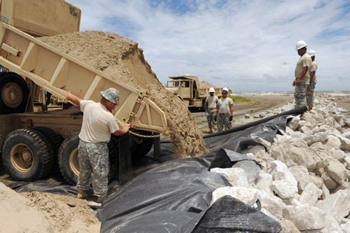 |
Military efforts along the Gulf Coast continue today as part of the federal response force to clean up the oil spill.
About 1,900 Defense Department and associated personnel are deployed to the Gulf. They are providing ongoing support to contain the leak and clean up the spill, including military-owned skimmers and pollution control equipment, Pentagon spokesman Army Lt. Col. Robert L. Ditchey II said today.
The military also is providing funding for National Guard support to state governors in the region, as well as staging areas for boom and logistical coordination along the coast and at sea, Ditchey said.
The Coast Guard has been leading the federal response there since April when the Deepwater Horizon oil rig exploded. The explosion resulted in hundreds of millions of gallons of oil gushing from the sea floor.
“We have been working together closely with the U.S. Coast Guard from the beginning,” Ditchey said. “We are committed to supporting the response effort for as long as we are needed.”
The Navy, he said, has 19 skimmers and 29 tow boats in the Gulf to help soak up the oil. The Naval Sea Systems Command has oversight over those vessels and equipment. The command expects additional assets in the region in the coming weeks, Ditchey said.
The Naval Oceanographic Office has deployed 24 drifting buoys and 10 profiling floats to monitor wafting oil, he said. The buoys process data for ocean forecast models, he added, which are conducted daily.
A Naval Air Systems Command MZ-3A airship is deployed to the Gulf, and is acting in a reconnaissance and tactical direction of operations role, Ditchey said. The airship can direct skimming vessels to oil for skimming, he added.
Meanwhile, National Guard is supporting local, state and federal authorities with aviation transportation, reconnaissance, security, hazardous materials training and other assets, he said. The Guard has 15 dedicated helicopters for transportation and reconnaissance missions, he added.
National Guardsmen also assisted BP in taking claims from Gulf residents affected by the spill, Ditchey said.
In May, the Defense Department transported 150,000 feet of BP boom and 250 short tons of Navy pollution control and salvage equipment from Alaska to Louisiana, he noted.
The Air Force’s 910th Air Wing out of Youngstown, Ohio, flew numerous sorties for about a month through May, Ditchey said, spraying dispersing agents to neutralize the oil. The air wing redeployed last month, he said.
“We have been working together closely with the U.S. Coast Guard from the beginning,” Ditchey said. “We are committed to supporting the response effort for as long as we are needed.”
The Navy, he said, has 19 skimmers and 29 tow boats in the Gulf to help soak up the oil. The Naval Sea Systems Command has oversight over those vessels and equipment. The command expects additional assets in the region in the coming weeks, Ditchey said.
The Naval Oceanographic Office has deployed 24 drifting buoys and 10 profiling floats to monitor wafting oil, he said. The buoys process data for ocean forecast models, he added, which are conducted daily.
Navy aircraft are conducting reconnaissance to detect oil that can be skimmed, Ditchey said. The aircraft alert suitable vessels to those sites for skimming, he added.
Meanwhile, National Guard troops are supporting local, state and federal authorities with aviation transportation, reconnaissance, security, hazardous materials training and other assets, he said. The Guard has 15 dedicated helicopters for transportation and reconnaissance missions, he added.
National Guardsmen are also assisting BP to take claims from Gulf residents affected by the spill, Ditchey said.
In May, the Defense Department transported 150,000 feet of BP boom and 250 short tons of Navy pollution control and salvage equipment from Alaska to Louisiana, he noted.
The Air Force’s 910th Air Wing out of Youngstown, Ohio, flew numerous sorties for about a month through May, Ditchey said, spraying dispersing agents to neutralize the oil. The air wing redeployed last month, and was backfilled by a civilian aircraft company, he said.
This article has been published with permission from the American Forces Press Service.











